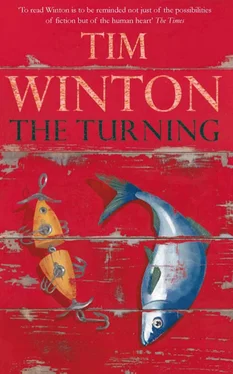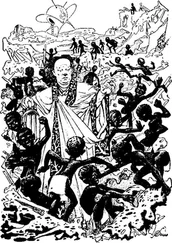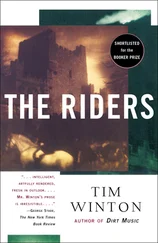What undid him was not the approaching anniversary of his wife’s death but the onset of winter. He was, quite suddenly, overtaken by disgust.
All it took was a change in the wind. He hated winter. The first major cold front of the season was heralded by the usual blustering nor’wester, a wind that always seemed used up and clammy, too eerily warm for what lay behind it, but this gusting breeze was especially dirty because Dyson woke early to the terrible stink of sheep. Being a country boy, he wasn’t particularly sensitive to the smell of livestock. But this was the concentrated urinal stench of thousands of merinos being stacked in a floating high-rise. Down on the docks they were loading live cargo for the Saudis. Rising to pull down the window sash he found that the odour was in the curtains already. Outside on the line, the damp washing was tainted. The whole town was overtaken.
At breakfast Ricky wanted to know where the stink came from. There was no point in keeping the sordid details from him. They’d have to pass the ships on the way to kindy anyway and he’d see for himself how they jammed them in tier upon tier. He told the boy about the weeks the animals spent at sea and the awful heat and the mortality rates and how the knives awaiting them at the other end must come as cruel relief after such an ordeal. Ricky grew silent. Dyson regretted his frankness. Neither of them could finish breakfast for the smell of death in the house. Dyson helped the boy dress and afterwards, trying to shave, he began to shake. He suddenly knew there was no way he was going down into that garage this morning. Even if he could make himself roll up the door and start the car, the smell of monoxide would set him off. You couldn’t trust yourself to drive in that sort of state, not with a child in the car. The whole business was suddenly at the back of his throat; he was brimming.
Ricky enjoyed the taxi ride. Dyson smiled for him despite the sick smell of the driver’s sweat and the oppressive babble of FM radio blasting into him from behind. When the boy was safely delivered, Dyson got out at the public pool whose sun-shades and pennants snapped and lurched in the mounting gale.
The pool was a grim morning ritual. The point was supposed to be to lose weight and regain some fitness but the real benefit lay in the monotony of swimming laps. For half an hour every morning, while he hauled himself through the water, he went mercifully blank. He preferred this time of day because the initial rush was over, the wiry execs and hairy machos were gone and the average lap speed was less frenetic. Mothers, retirees and a few shy students swam without hounding each other up the lanes.
But this morning the changerooms seemed unaccountably damp. Their pungent cocktail of bleach and mildew made his head spin. Even the pool water felt wrong; it was soupy and the chlorine made him gag. On his first lap every breath tasted of sheep piss. It was a relief to feel the distracting chill of wind-driven rain on his back.
He always liked the way the pool rendered the plainest body handsome. It cheered him to see the fat become stately and the aged graceful. Today, in an effort to break this dangerous mood, he concentrated on the feet kicking ahead of him and the pearly bubbles that trailed in their wake. Lap after lap he found himself behind a woman whose toenails were lacquered a kind of burgundy. It was the colour that initially caught his attention. There was something luscious about it. He became mesmerized by the symmetry of the woman’s toes and then by the delicate veins that stood out in the high arches of her feet which, against the chemical blue of the pool, were as white and comely as those of any classical statue.
He crawled along, bewitched in the woman’s wake. She was a good swimmer. Her legs were strong. As she churned through the water ahead of him he watched the movement of her calves, her working thighs and the mound of her buttocks. She was beautiful. He loved her belly in the nylon sheath of her Speedo suit and the way her breasts moulded to her. The water he swam in became turbulent. Without realizing it, he’d sped up until the woman’s feet were almost striking him in the face and when he backed off he lost rhythm. Dyson tried to shift his attention from the swimmer ahead by taking an interest in people passing in other lanes, but it was no better. They were, all of them, lithe and delicious. He had a perilous urge to reach out and touch smooth limbs, to lay his cheek, his ear, his lips against every firm belly. Each new swimmer, male and female, was more beautiful than the one before and he swam without really breathing for fear of interrupting this view of perfection until his stroke became ragged and the air he was forced to gulp tasted foul. Blots and sparks rose behind his eyes and he blundered, gagging, against the lane rope to hang there like a piece of snagged trash.
When he had recovered somewhat, the sky was dirty-dark above him. As they climbed from the pool his fellow swimmers regained their varicose veins and moles and hanging guts. The sudden ugliness of everything was crushing. He felt a poisonous surge of revulsion towards everything around him but nothing disgusted him more than himself.
During his final punitive sprint to the wall, the water around him was all Band-Aids, floating scabs and hanks of hair. He was roiling through sweat and spit and other people’s piss and when he hoisted himself out, the air was just as brothy.
On all fours, dripping and panting until he began to sob and cause people to step around him in consternation, he knew that things were wrong, that he had to make a change. Everything here was tainted now. Continuing to pretend otherwise was simply and finally beyond him.
In the spring Dyson packed up and moved south. He took possession of his mother’s house on the hill above the harbour in Angelus. He knocked out a wall and painted the rest in colours that would have made his mother blanch. The roof was fair, the foundations good and being home gave him a sense of satisfaction that might once have alarmed him. He was not blind to the irony of starting over in a house and a community he’d long ago left behind, but it was a ready and practical option and it was the least disruptive for Ricky who seemed to love the place. Right at the outset Dyson sensed how much less force of will it took for him to be himself in front of his son and this new ease seemed to relax the boy. He’d never seen so clearly how this worked, how the boy took his emotional cues from him. He couldn’t imagine what he’d done to the kid already without realizing it. He had to think of the future and to seem happy with their new start.
Although Ricky was enrolled at a kindergarten an easy walk from the house, Dyson kept him home for the first week of term so they could explore the old town together and he could give the kid his bearings. They walked the white beaches and hiked over the granite bluffs that dominated the harbour. From a windswept lookout, staring south across the whitecapped open ocean, they tried to picture the ice, the penguins, the very bottom of the world. Back at home Ricky passed nails while Dyson built him a cubbyhouse between the peppermints in the backyard. In the evenings, for as long as they could stand the cold, clean wind, they watched the lights of ships track through the narrow entrance to the encircling harbour. Rain chattered on the roof at night as father and son lay spooned together in bed.
For a day or so Ricky was fascinated by the idea that this was once his grandmother’s house. He was so young when she died that he didn’t really remember her but he insisted on seeing photographs, especially those few with him and his grandmother together. Dyson dreaded the photo albums but let the boy thumb through them, enthralled. Within the hour, Ricky had moved on to some fresh enthusiasm. He was small for his age, a serious dark-eyed child, curious and rarely fearful. Dyson himself had been, he gathered, much like him. He treasured the boy for selfish reasons. Ricky was the only thing that offered his life any meaning. He couldn’t bear to think what damage the past year had done him.
Читать дальше












